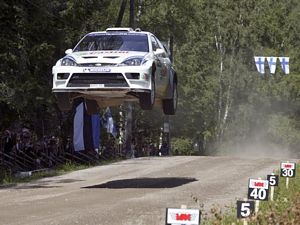|
By accessing/using The Crittenden Automotive Library/CarsAndRacingStuff.com, you signify your agreement with the Terms of Use on our Legal Information page. Our Privacy Policy is also available there. |

Why We All Love Rally Cars
|
|---|
|
|
Why We All Love Rally Cars
Matt Hubbard
Speedmonkey
January 22, 2014
Audi has won Le Mans 12 times and it has won the World Rally Championship twice. Which one influences your perception of the brand more, the various Rs that have won Le Mans or the Quattro that won the WRC in 1982 and 1984?
In all probability it's the Quattro. Had Audi never built the Quattro and competed in world rallying would we still hold the brand in such deference, despite 12 Le Mans victories?
Same goes for Ford. 10 F1 world constructors championships have been won with Ford as engine suppliers but Ford's motorsport heritage in terms of customer impact rests largely on its rally successes. Who can forget Colin McRae, Carlos Sainz, Marcus Gronholm or Marko Martin battling Focus RS's on the international rally stages.
Sure, the F1 victories don't hurt but would you buy a Mondeo on the back of those F1 wins? Maybe, but probably not. But it's a sure fire certainty that thousands and thousands of Focuses were bought directly as a result of its rallying campaigns.
Rallying directly transformed Subaru and Mitsubishi from niche brands into mainstream manufacturers and, despite their lack of participation in recent years, they are both still living off that legacy.
Rallying gives a brand coolness, a glow that no other form of competition can match. The cars look the same as the cars we can buy in showrooms but stick them on a 14 mile rally stage full of jumps, gravel, snow, mud and sheer drops and they look epic.
No-one who bought a Subaru Impreza did so because it was a sensible, reliable saloon with a fruity exhaust note and a reasonable amount of boot space. They bought one because they wanted to be Colin McRae.
Audi release concept after concept and SUV after SUV but the only time we become excited about them is when they contain the name Quattro, because we hope some of the DNA of that original rally car might be carried over. And when we see the latest Quattro concept we are disappointed because it is nothing like a rally car.
You would think BTCC should do the same, given the cars are silhouettes of those we can buy. But it isn't. Touring car racing can be fun and spectacular but the focus is on the drivers rather than the cars. Jason Plato has won 20 BTCC races in the past two years in an MG6. In that time MG has sold just over 1,000 MG6s. A pitiful record.
But rallying has fallen on hard times recently. No-one watches it because it's hardly on the TV, and the stages and the events themselves are too short, and not in the right places, and the cars don't look spectacular enough. And Sebastian Loeb won so many championships we all got bored and watched something else instead.
Volkswagen won the 2014 World Rally Championship with a Polo R, but nobody noticed. More's the pity. Car enthusiasts need WRC to bridge the gap from competition to street car. The fact that the general public don't care about WRC any more means that not one Polo will be bought off the back of their world championship. And that is a bad thing.
Supercars are all well and good but nobody normal can buy them. WRC transforms normal cars into superstars that we can all lust after. Where will the next truly iconic but affordable car come from if WRC is ignored?
The Renaultsport Megane 265 is a brilliant car. If Renault were to campaign it at World Rally level and win, it could become legend. But the fact they haven't means it will forever be respected amongst petrol heads, and unknown by the general public.
World Rallying needs to rise once again to become the spectacular, popular showpiece it once was. Then manufacturers will be willing to throw huge amounts of budget at it to transform their humdrum machinery into the wider public's eye, and to create a modern day equivalent of the Lancia Stratos, Audi Quattro, Subaru Impreza, Mitsubishi Evo, or even Talbot Sunbeam Lotus.



















